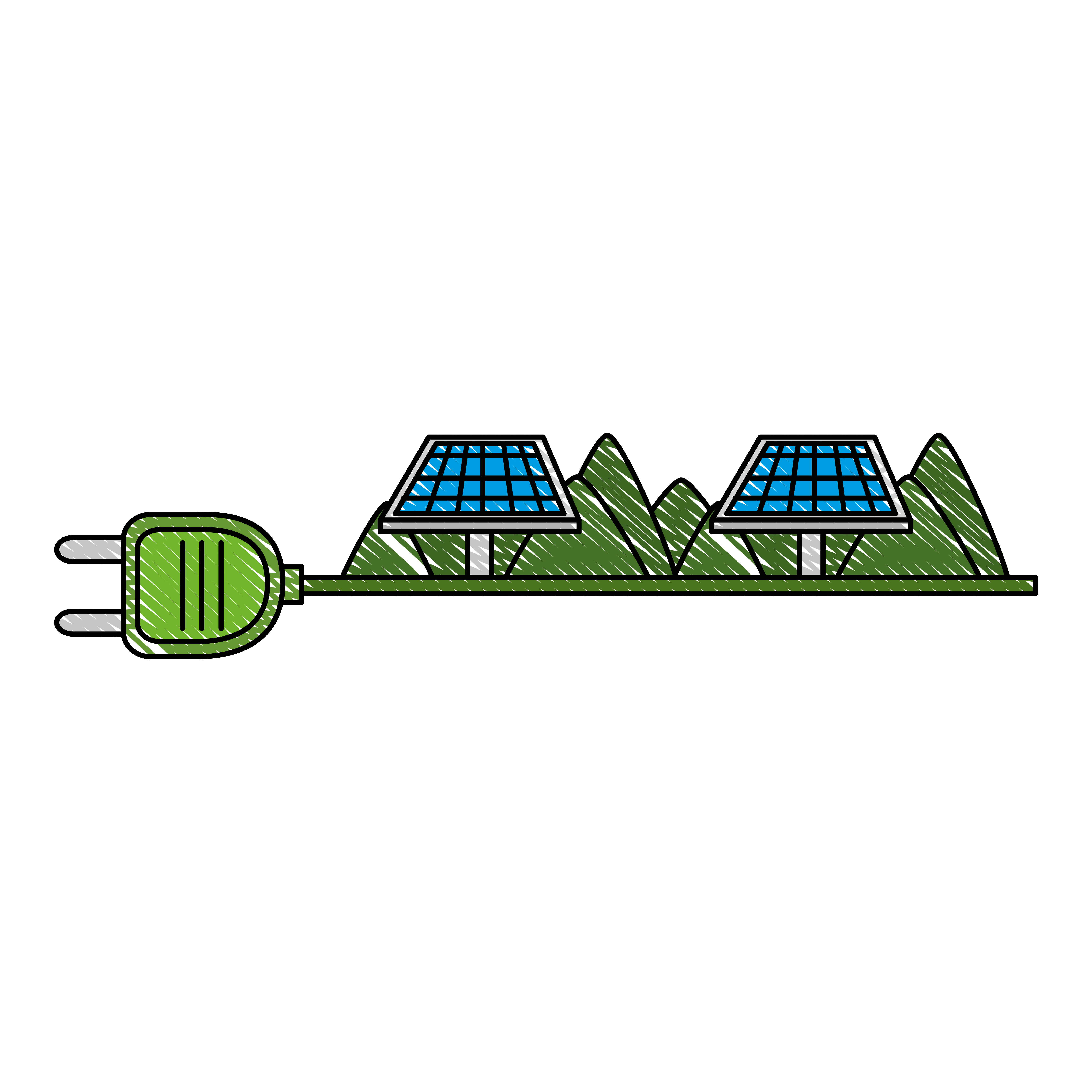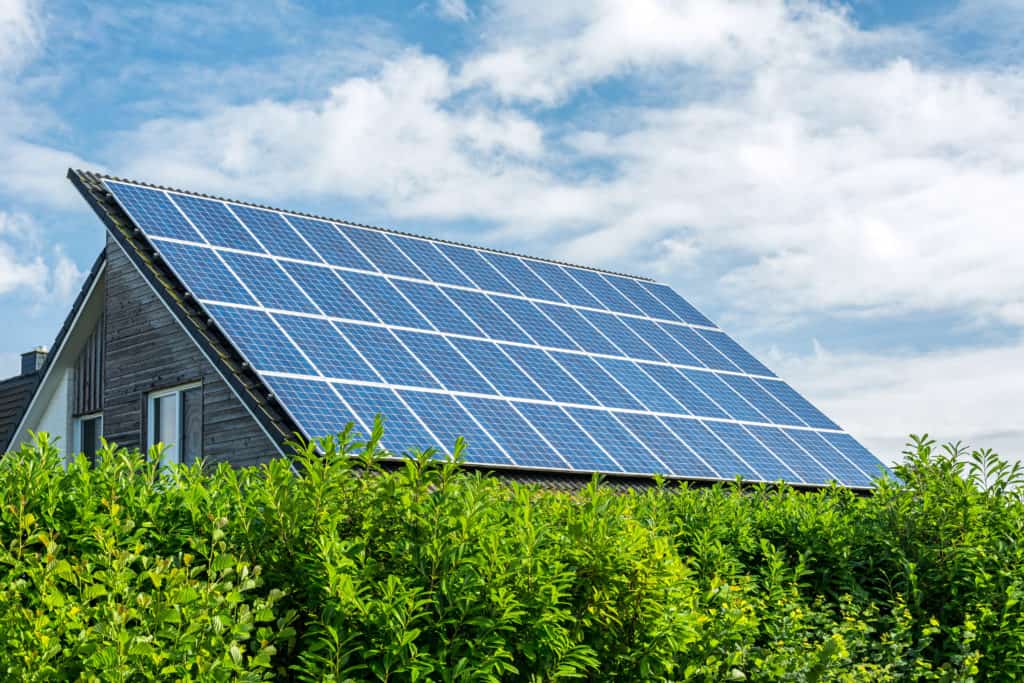
Recently, solar panels have become very popular and are widely known as being more environmentally friendly. People are using solar panels at great length, and have began to rely on them in greater numbers.
Solar panels alone can power an entire home. The number of panels, their angle, and the climate where you live will create varying efficiency, but overall solar panels can power your home and help you save time, energy, and money.
Solar panels can be incredibly helpful as you try to cut down on your power bill. After paying for the panels and the installation, there are no monthly payments, essentially giving you free energy. It will help to understand how they power homes, how many panels will be needed and how they work.
How Do Solar Power Work?
“The amount of sunlight that strikes the earth’s surface in an hour and a half is enough to handle the entire world’s energy consumption for a full year” source. If that is the case, surely our homes can be powered easily by a collage of solar panels atop our roofs.
“As solar panels protrude from the precipice at various angles, they capture whatever sunlight is available, and convert it to DC power. An inverter converts the DC power to AC power” Source. The sunlight hits the silicon solar cells, and causes a movement which generates electricity. The amount of sunlight is varied based on the position of the panels and the sun, but the creation of energy is still happening!
Compared to what we know about the human body, solar panels work in a similar way. “When sunlight hits your skin, the electrons in the atoms of your body vibrate quickly to generate heat. But electrons do something different in silicon. The electrons start moving around. This means that the sun’s energy is conducted into an electrical current, rather than static heat.” The sun and its rays are so useful and can help us in a variety of ways as we try to say money, help the environment, and and generate power.
Advantages & Disadvantages of Solar Panels
Before we get into exactly how we are to have enough solar panels to operate all our home electricity, it is important to understand the key advantages and disadvantages of running an entire home on solar energy. These will help us have a greater understanding as we learn more about using solar to power an entire home.
Advantages of Solar
- Solar is a constant, renewable source of energy. It’s one of the most reliable forms of “weather-based” energy, when compared to wind farms.
- Solar power allows can be used to generate heat as well as electricity, making it great for emergency situations.
- It can be a huge help in either reducing or covering your entire energy bill as it will generate power for your lights, heating, and every other electrical thing in your home.
- The science behind solar panels is getting better every day, so over time, the price will go down, and the efficiency will go up.
- The cost to maintain solar panels and their upkeep is fairly low. They hardly ever need maintenance once they have been installed properly, and when they do, it doesn’t cost an arm and a leg.
Disadvantages of Solar
- The most common known disadvantage of solar is that it NEEDS THE SUN. It is dependent upon good weather, and in some places of the world that can be pretty rare. Though they are still able to produce electricity on cloudy days, their efficiency goes down.
- Money always seems to be a disclaimer as well. Solar panels can be expensive to purchase and install. You would need to purchase all needed supplies like the panels, inverter, batteries, wiring, and labor. However, once you buy it all, it’s yours to keep, and it starts saving you money right off the bat!
- It is also hard to store the energy produced by solar panels (you may need to store it so that on cloudy days you can still heat your house). Solar energy is only active in the daytime hours, but power is needed all the time. Large batteries can be expensive.
- The roof you have will no longer be visible once you get solar panels! Solar panels take up quite a bit of space, so ask the professional you are purchasing from how much space you’ll need to power your home before you make any decisions.
How Will Solar Panels Power An Entire House?

As an overview, it is important the first understand the implications behind purchasing solar panels, like calculating cost, power output and their effectiveness in your area. Once you have done this, they will need to be ordered and shipped to your home and the installation process will begin. The steps of doing this may seem a little complicated at times, but as you go through you will be glad to see the results you produce.
First, you need to know how much energy your household consumes. This includes the energy from heating and AC, as well as lights, dishwashers, and other appliances. You can calculate this by looking through your monthly statements, or by calling your power company. “In 2019, the average annual electricity consumption for a U.S. residential utility customer was 10,649 kilowatt-hours (kWh), an average of about 877 kWh per month” Source. Once you know how much power you are using, you can find ways to reduce the power you use and determine how many solar panels you will need. Moving from the power grid to off-the-grid can be a big change, and you will have to be more aware of the energy you are using and the energy you will need.
Next, you need to choose the type of system and panel that will work for you. “An average solar power system varies in power production, depending on the solar panel type. A 1 kW PV system can produce around 3 to 4.5 kWh of electricity a day. This output equates to 1095 – 1640 kWh per year. Increase are linear, 3kW solar system can produce three time that of a 1kW system” and so on and so forth depending upon the amount of power you need Source. Pick out the panels that will work best for you and the power you will need!
A storage battery will be the next thing on the list. Choosing what type and size of battery you will need will also depend upon your energy consumption and how much you will need to store based on the climate you live in. This will be essential because you will need energy at night as well. The power you produce in the day will be used throughout the day, and hopefully you are generating enough power to have some left over for the dark hours of the day.
After you have your system chosen, your house size and energy consumption measured, and that battery you need ready, you can start installing the system! Choosing a good manufacturer and installer is essential to the longevity of your entire system. The better the connections, wiring, and panels the less trouble you will in the future.
You will now have to live within a limited power supply, and while that can be easy, it can also pose quite the challenge. If needed, solar panels can generate power for part of your energy bill and just cut down the costs, or they can purely run the house in the daytime and you can switch to the power grid at night in order to save but not be so dependent upon their function and the actions of the weather.
How Many Solar Panels Will I Need?
Knowing how many solar panels you need can also be really tricky to figure out. How much space is even available on your roof? Which parts of your roof get more sun? Which parts get less? What angle should the panels face in order to get the most direct light? What size of solar panels do you want? These and many other questions should also be considered as you start and go throughout this process.
On average “a typical American home will need 14-36 solar panels to cover their power bill and at least 227 square feet of rooftop space to accommodate solar panels” source. That average will help you to see a ball park to search for as you search out the number of panels you need. There are a variety of internet calculators which allow you to calculate how many you will need based on your energy usage and so looking at one of those in conjunction with your power bill will be helpful. The video below also explains the different situations which will affect the amount of panels you will need. But overall, you will need to look into the power you will need, the efficiency of the panels you choose, and the available space on your roof and you can customize your solar panel set up!
Benefits & Conclusion
In the end, you will be investing in the future of your home and of your family by purchasing solar panels. There are a variety of benefits that come with going completely solar and being independent of city utility systems.
It will help you to become more environmentally friendly and economical. You will leave much less of a carbon footprint. You are no longer connected to the city infrastructure and therefore you are able to do thinks more quickly and with less installation hold ups. As you construct and fun the solar system you will be eligible for more tax rebates and credits, saving you money each and every day as you power your own home in an effective way.
Another great benefit is that if you ever go to sell your home, it increases its value exponentially. “Installing solar panels in a home not only helps to reduce current monthly utility bills; it can potentially increase the home’s value by up to 4.1% more than comparable homes with no solar panels, according to recent solar research done by Zillow” source.

The power outages happening in town will no longer affect you. Though a power line may go down or a storm gets really bad, you have become independent of it and it will no longer affect you. Plus, if your roof is big enough and you are able to generate more power that you need for your personal needs you can give it back into the power grid and be paid to produce energy that can be available for other people to use.
Say you live out in the middle of nowhere and power is already hard to come by, solar panels and systems can help to alleviate that problem providing power where ever there is sun and wide open spaces. It gives you the freedom to live wherever you want because the sun is something that you can always access, no matter where in the world life takes you.
Living off the grid can be really rewarding! It is amazing to know that you are capable of harnessing and storing your own power in order to accomplish the things you need to on your own, and you can do it all while being friends with the environment.